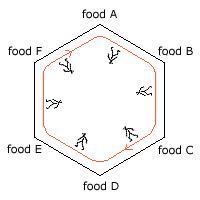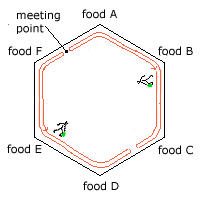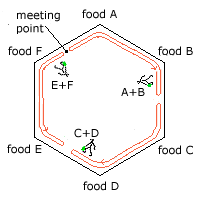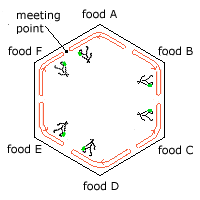
Related essays
Formation 1
Formation 2
Formation 3
In thinking about human society, people very often start with modern society in all its great complexity, and try to pick it apart. But another way to think about society is to imagine a very simple human circumstance based on a very few explicit asumptions, and explore its underlying logic. If it is felt to be so simple as to be entirely unrealistic, further explicit assumptions may be added, so that the model society begins to approximate towards a real society.
The simple model of a human condition used here (already explored) assumes that there are 6 food sources at the vertices of a hexagon, and humans need to maintain a balanced diet of all of them, and it takes half an hour to gather enough food for one human's daily consumption at any vertex, and 3 hours to walk from one vertex to another around the perimeter of the hexagon.
Humans start out as independent nomads walking between the vertices, collecting and consuming food for themselves at each one. However, a trading community - a simple human society - where individual humans collect and transport and trade just one food item each can be shown to offer a more idle existence than nomadic life.
From Nomadic Individual to Interdependent Society
|
Transition from an independent individual nomadic life to an interdependent trading social life may take place in easy stages.
At the outset (top right) nomadic individuals walk around the perimeter of a hexagon collecting and eating food at each vertex. If it takes them half an hour to collect a day's food for themselves at each vertex, and 3 hours to walk from one vertex to the next, then it takes them a total of 21 hours to make a complete circuit of the heagon perimeter - an idleness of 12.5%. If these nomads carry food with them to gradually eat as they make the circuit, and not all of them walk in the same direction around the perimeter, then food-carrying nomads will regularly encounter each other. Since they are travelling in opposite directions, such a nomad will regularly be carrying food that the other is on his way to get, and vice versa. If couple of nomads exchange what they are carrying, they will then find that they have also exchanged goal vertices, and each will turn on his heel and return the way he came. And if they follow the same schedule of walking and gathering, the two same individuals will meet again on the far side of the hexagon. (Right, second from top) Each will end up gathering twice as much of three kinds of food as they usually do, and their idleness will again be 12.5%. If a third individual joins them, then each will gather 3 times as much of two kinds of food, taking 3 hours. And each will walk only 4 sides of the hexagon rather than 6 sides, and so total walking time will fall from 18 hours to 12 hours. Total working time will thus fall from 21 hours to 15 hours. And idleness will rise to 37.5%. And if another 3 individuals join them, each collecting enough food for 6 people at each vertex, and walking 2 sides of the hexagon to exchange them, idleness rises to 62.5% (right bottom). |
|
In principle, this arrangement will result in all individuals being supplied with enough of each food each day, although food may take a day or two to be transported around the hexagon from the far side. At the same time, individuals will tend to stay in more or less one place on the hexagon.
Rising and Falling Idleness
As described in this simple model, the gradual transition from a wandering independent individual life to a settled interdependent social existence is ome that sees idleness rise from 12.5% to 62.5%.
If nothing else, this represents a considerably more secure way of life. For if conditions temporarily deteriorate so that it takes 4 hours to walk from one vertex to the next, the idleness of the independent nomadic lifestyle falls to zero, and it becomes unviable. Either such independent nomads adopt a more idle way of life, or they perish. By contrast, the same deterioration would see the idleness of a trading society fall from 62.5% to 54%. It becomes slightly busier, but its continued existence is not threatened.
A more idle social way of life would also provide its members with greater freedom of action. While individual nomads have only about 10% of their time to dispose of as they choose, members of a trading society have over 60%. It is during this time that they can, if they wish, decorate themselves and their goods, produce art and music, engage in conversation, or inquisitively explore their world.
In this manner, the members of a simple trading society enjoy greater security, freedom, and wealth.
It might be, however, that none of them wanted any of these unfamiliar things, which they had perhaps never known before. The wandering nomads may well have been content with their life, difficult as it was, because they knew no other. Yet circumstances probably regularly conspired to force them to abandon one way of life and adopt another. Just as a rising sea level will force a people from the coast into the hills, so falling idleness will force people from a busy way of life to an idle one, without them wishing for such change.
In a circumstance where idleness tends to always be gradually falling, people will find themselves having to innovate continuously, continually modifying their way of life to maintain idleness. They may not adopt new ways of life because they are attracted by them, because they want them, but because they fear the alternative. And so even if people do not want to change, they will often be forced by circumstances to change anyway.
Costs
The shift from an individual wandering existence to settled trading society, whether chosen or forced, brings benefits in the form increased idleness. But it also comes with costs.
And the cost of human society is that it requires its members to adhere to a set of rules of conduct. In the little society illustrated here, those rules are that each individual will gather enough food for everyone each day, and each day meet and exchange food with both his neighbours, very possibly at set times of day. And they must do this day in and day out, with considerable discipline. If one member shirks his task, the whole society fails, and its idleness plunges.
And the rules of conduct that apply to a society may need to be modified with changing circumstances. Or improvements might be proposed. And so a society must have some way of producing and modifying rules, and of enforcing such rules. It has to have morality and law, and a political structure that allows it make and change rules.
However this is achieved - whether through the decision of a single individual, or through democratic debate - moral codes and legal processes will need to be carefully considered. And this takes time.
At the minimum, a set of rules - a moral code - is adopted, and everyone adheres to it, and it is never changed, or seen to require change. And no time is devoted to revising the rules or to enforcing them. But alternatively some initial set of rules may be found to be deficient and need to be changed, and modifications proposed and argued over, and when some new rule is adopted, people may break the rules, and be penalised, and a great deal of otherwise idle time come to be devoted to what might be termed political and moral and legal issues.
Given these very real costs, some individuals may prefer to return to a simpler nomadic life - if it can be lived - than endure the new and perplexing problems of social existence. For the individual nomad, outside of any society, has no need of morality and law. However, if the social form of existence is the only viable way of life, then individuals will have no option but to stay on within human society.
The shift from a nomadic life to settled society entails, in many ways, substituting one set of problems for another.
Emerging Rules
The little 6-person society that has been formed is one in which its constituent individuals obey certain rules. Each person, acting according to a rule, collects sufficient food for six persons, and carries some to his neighbour on one side, and the rest to his neighbour on the other side.
How did this rule come into being? One seemingly obvious way is that, prior to the formation of this society, its constituent persons meet and agree to take their places in the circle, and to diligently obey these few rules. But questions arise about such a procedure. How do they know, in advance of forming this experimental society, whether their proposed rules are the right rules or not? And what will be their goal in forming this society? If there are 6 persons, might there not be 6 goals, 6 separate aspirations? Is it not likely that, having agreed upon some set of rules, when they set out to put them into practice, they find that they are actually unworkable?
Another way that this society might form is not through prior agreement, or any social contract, but instead by each person gradually modifying his own personal set of rules by gradual stages until it so happens that, starting out as a wandering nomad, he ends up as a settled trader. Individuals decide for themselves what makes life easier for them, by trying out different rules, different patterns of conduct. A simple human society may well form quite spontaneously from a series of small changes in behaviour. And the members of this society might not even be aware that they had formed a society, any more than individual atoms might 'know' that they have formed a complex molecule. Or, only over a period of time might the individual members of a society discover that they were part of a society.
The advantage of the latter process is that there is no need for all to meet and agree, and in doing so face difficult questions about who decides the rules, and what the rules should be. The disadvantage of this process would be that it might take quite a long time for separate individuals to hit upon the set of rules that results in the the best - the most idle - society. But once men become aware that they are members of a society, and begin to understand its logic, they might see ways in which rules might be changed to hastene its development towards an optimum order. And so the actual way that human societies form and develop is perhaps both through the operation of individual initiative at a personal level, but also through study and debate and agreement at a social level.
A further consideration in this is that inventing and trying out new rules is a process that takes time. An individual who is thinking of adopting a new rule may consider a variety of alternatives, and select one. He can only do this in his idle time, when he is not busy doing something else. And the same applies far more to any human society, that if its members are to meet up and discuss its rukes, and propose changes, and agree to such changes, they can only do this in their idle time. And if a single individual can make a decision very rapidly, but debates between people take far longer to reach decisions, then the least idle societies will not have the time for such debates, and decisions will be left to individuals acting in their own best interests. Either that, or only a few individuals will be able to meet and discuss and make suggestions for the improvements in social organisation.
Accordingly, in busy societies, where it is not possible for for collective debate and decision to take place, the decisions get taken by individuals. Either that, or the power to make collective decisions is assigned to a single individual or oligarchy. Democracy, in which all individuals participate fully in making collective decisions, is something of a luxury that only relatively idle societies can afford.
In whatever way the rules of conduct may emerge, whether they arise naturally from custom and practice, or are handed down from above by kings and legislators, they will provide the morality of that society - what they must and must not do. If those rules are not obeyed, the idleness of any society will fall. In the least idle societies, failure to adhere to the rules may threaten the continued existence of society. In such societies, rule-breaking may be severely punished.
Gaining Idleness, Losing Spontaneity
Independent self-sufficient nomads have no expectations of other humans. They will arrange their daily tasks to suit themselves. But once humans become dependent on each other within some human society, individual humans can no longer act purely in their own self-interest.
In the simple trading society considered, each member is expected to gather enough food for everyone at his vertex of the hexagon, and take this to his neighbours for further distribution. If this entails meeting at an agreed place at an agreed time, then the humans must gather enough food in the preceding time, and set out walking to the meeting place several hours before the scheduled meeting. They can no longer do as they please. If they miss their appointment, not only do they get no food, but other members of the society will also go hungry, and will have to go and collect the missing food for themselves, which will entail a fall in social idleness. If this human society is going to operated at its maximum idleness of 62%, its member have to exercise discipline in performing their allotted tasks on time. They can't spontaneously do whatever they like. So while they gain idleness from the transition from individual nomadic life to trading society, they lose spontaneity. Their lives become ruled by clocks.
Individuals in human society are always likely to find that they are governed by timetables that require that they not only perform work, but perform it at a particular time, so as best combine with the efforts of others. After all, if 6 men are required to drag a tree trunk from one place to another, they must all meet up at the same time, and not at different times of the day.
The Individual and Society
In our simple human society, when individuals work, they are almost always working on behalf of other individuals. The man who collects apples is not collecting for his own consumption, but for 5 other people. Humans are thus most fully social creatures, serving others, when they are working in society. They only become spontaneous individuals when they cease such work. And so they are social creatures while they are busy, and free individuals when they are idle.
This means that in the busiest societies, people will be almost entirely socially directed, or other-directed, more or less continuously working for other people. And in the idlest societies, they will be almost entirely free individuals, self-directed, doing what they themselves wish to do.
In busy societies, in which people are mostly working for each other, human life may tend to be regimented, with little personal individual freedom. The busiest societies may be hierarchically organised with chains of command, in military-like structures. In the idlest societies, such hierarchical organisation will be either vestigial or absent, and life will be almost entirely free and spontaneous.
However, if a command chain requires work to be done to sustain it, and imposes a burden upon society, then command chains will tend to break down in the busiest societies, ones which have not the idleness to support them.
Inequality
In the simple model of society used here, the gradual appearance of an interdependent trading society is accompanied by rising and equally distributed idleness. Such an equality grows from the explicit or implicit assumptions that the same work takes the same time for different individuals, that all walk at exactly the same speed, and the collection of food at the vertices of the hexagon takes equal time. If these assumptions are relaxed, then it is certain that different individuals in different places will have different degrees of idleness.
Does this matter? If such a society appeared quite spontaneously, rather than through prior agreement, perhaps it would not matter. But if it had been set up through some sort of prior social contract, it is rather hard to see that there would have been prior agreement to any sort of unequal distribution of the gains in idleness that a trading mode of existence would have accrued. Any social contract would surely have included an equal shares clause.
Regardless of any prior agreement, or lack of one, there is one sense in which an equal distribution of idleness may become very important. And that is that, in a circumstance in which idleness is falling, the least idle member of a society is the most likely to become unable to fulfil his allotted tasks. He is the weakest link in the chain, and will be the first to fail. And when the weakest link fails, the whole society fails. And so it must be prudent of any interdependent society that it take care to ensure at least an approximate equality of idleness among its members.
And yet, if there exists inequality, some work will need to be done to effect a redistribution of idleness. And therefore there will always be a cost - in the form of decreased idleness - in ensuring equality. If this cost is high, then the cost may outweigh any benefit.
And again, if in some established society, in which idleness is equally distributed,, one individual finds some way of expediting his work, then he will become more idle than them. This might happen if he found that it was easier to collect food using a knife, or carrying food in a bag. At this, the distribution of idleness becomes unequal, even though the others have not lost any of their degree of idleness. Should the society then make some adjustment to restore an equality of idleness? It would mean that, in a society of 1000 persons, if one man found a way of saving an hour of work a day, then it would almost all be taken away from him when this was redistributed among the others, and his idleness would only increase by 3.6 seconds per day. Might not the prospect of making such a small gain act to deter him from bothering to think of innovative ways of working more efficiently? And if such innovation underpins economic growth - rising idleness - the attempt to enforce equality might throttle such growth.
Tools
In this simple account of the formation of human society, there are no tools. All the increases in idleness are achieved by adopting different cooperative strategies.
This is not to say that tools might not be needed. In this trading model, humans gather and carry more food than they would as individual nomads. And while it's plausible that they could carry a few items of food using their unaided hands, as they carried more and more they would have need of bags or baskets (or their equivalent) to carry food, if they were to avoid repeat journeys.
Again, while an untooled individual nomad might gather and consume a relatively small number of food items - say 10 -, once he is collecting food for five other people as well, he will be repeating the same process over and over again. Instead of collecting 10 fruits from a tree, he will be collecting 60. And the simple fact that he is carrying out the same procedure so frequently, day after day, might provide an incentive to find quicker ways of doing it - an incentive that might be absent where only a small number are collected. If, for example, a long stick would enable fruit to be dislodged from a tree twice as quickly than by climbing up it to pick them, then this would reduce collection time from half an hour to quarter of an hour. But if it took a quarter of an hour to find or make such a stick, then nothing would be gained from using a stick. But where someone is collecting food for 6 people, the stick would cut collection time from 3 hours to 1.5 hours, and if the cost of making the stick is subtracted from this, there is still a saving of 1.25 hours of collection time. And there is a greater saving if the stick can be used over and over again.
This suggests that it is only once there is a division of labour, with individuals assigned repetitive tasks of one sort or other, that there appears a strong incentive to manufacture and maintain useful time-saving tools.
Language
Self-sufficient individual nomads have little need of language. But once these nomads begin to engage in trade, they will have a powerful incentive to communicate, if they are not able to already. And if there is a need for a society to be organised, and different taks assigned to different people, there must be an even more powerful need for communication.
And in the absence of language, it must be quite impossible for any sort of social compact to be made with other humans, so that the only way that human societies could form in the absence of language would be through spontaneous self-organisation.
In this respect language is clearly very useful. It not only opens up the possibility of adopting a variety of pre-planned strategies, but it also expedites all manner of transactions between humans.




